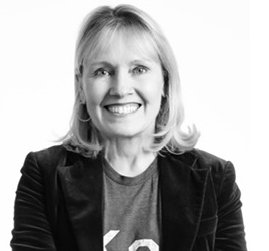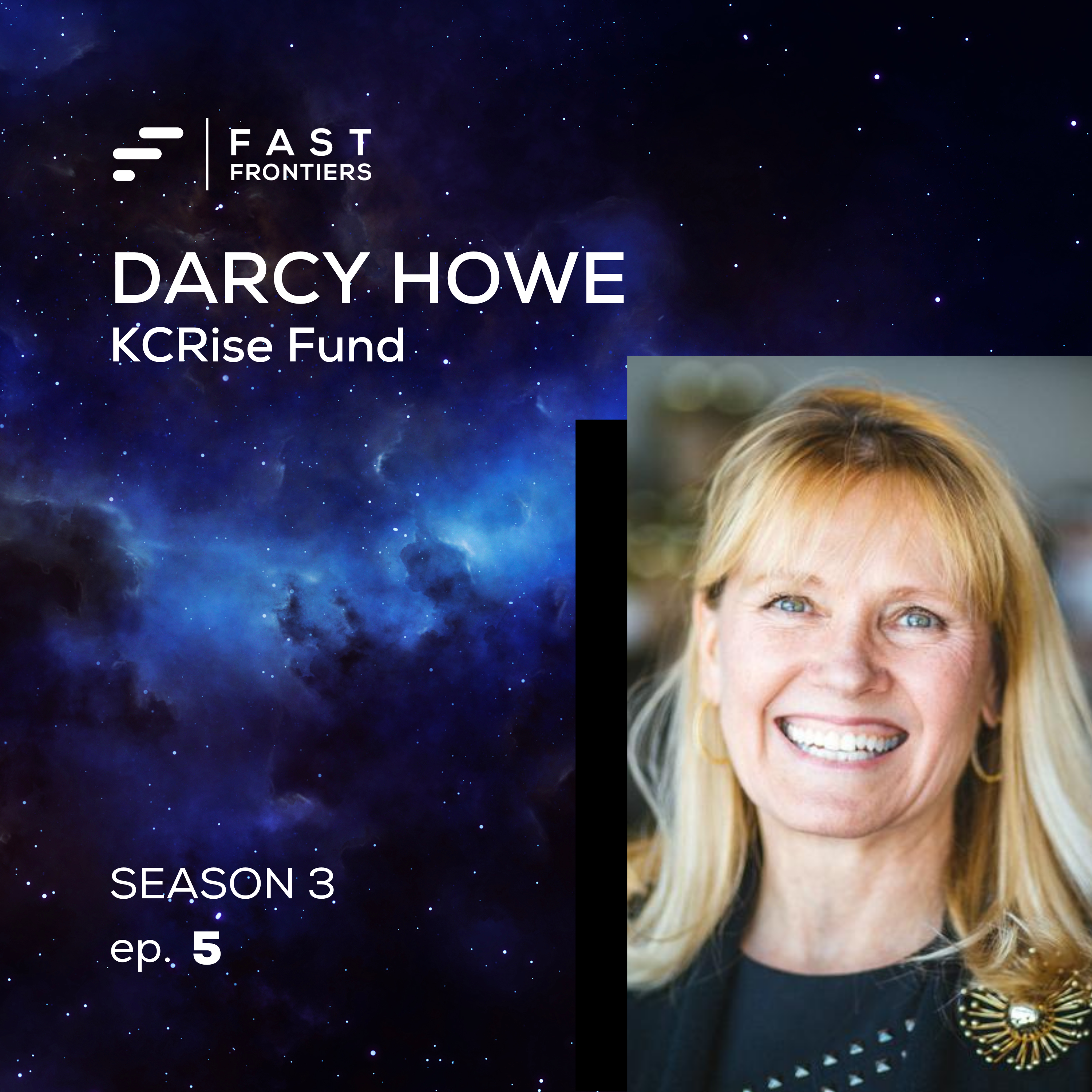S3 Ep 5. Darcy Howe: KCRise Fund
- 0.5
- 1
- 1.25
- 1.5
- 1.75
- 2
Tim Schigel : Welcome to Fast frontiers. I am your host, Tim Schigel, managing partner of Refinery Ventures. In today's episode, we're talking with Darcy Howe, founder and managing director of KCRise Fund, which launched in 2016 as an initiative of KC Rising, which has a long-term vision for the greater Kansas City region, building capacity and bringing existing businesses to scale. In 2019, KCRise Fund II was launched bringing total committed capital to over 60 million. In this episode, we're going to dive into Darcy's background and her family inspiration, as well as her first career in private wealth management and investment banking, which led to her passion in early stage entrepreneurs. Darcy's also going to share with us what she believes is the secret sauce of Midwest startups. The biggest theme or so what I hope you can take away from this conversation is the importance of capital efficiency. Venture is the only place where we celebrate the dilution of the founder. The concern for any kind of founder is that when you raise too much money, your margin of error shrinks. You have to perform to perfection because in the venture world, investors are expecting at least 2X growth from the valuation of their round to the next. That means you've got to double your business probably in every 18 to 24 months. So be careful of what you give away in ownership in exchange for those investor growth expectations. Please enjoy my conversation with Darcy Howe. Darcy, it's so great to have you here on Fast frontiers. Welcome.
Darcy Howe: Thank you, Tim. Great to be your partner today.
Tim Schigel: Absolutely. So when you think of Kansas City and you think of startups, you think of Darcy Howe. I don't know if you know that, but outside of Kansas City, that is the case. When I came last time, you're very welcoming and I'm sure you're that way with all the other investors and entrepreneurs. So I really appreciate that.
Darcy Howe: You were here for the InvestMidwest, which was, I think it's been 25 years that InvestMidwest has matched angel investors primarily. But now it's getting a little more institutional. All of it's online today, but I remember you and I had a good conversation then.
Tim Schigel: Yeah, yeah. Actually, I used to go to Kansas City quite a bit years ago, years, many years ago because we did a big project with Hallmark greeting cards.
Darcy Howe: Well, Hallmark is a good example of how a lot of our incumbent companies that have been very generous, both philanthropically, civically, and great jobs brought people from out of town to here for great work. They are on the downside, right? They're reducing their work force. So I think it's a good starting place about innovation and entrepreneurship because communities and regions like ours thrive when you have green chutes of new companies, because inevitably companies will have a certain seasons and Hallmark is a good example of a market leader. They created the greeting card market literally, and couldn't quite figure out how to do it in such a way that other competitors who are small or more nimble could, and it's affected their business. There's still a very strong part of Kansas City and a wonderful, wonderful group and family that owns and runs the company. But it's really been a tough entrepreneurial story lately even though it was a great one, two generations ago.
Tim Schigel: Yeah, like I said, it was many moons ago. So first of all, just kind of going into your background, which I think is really interesting and how you got to this early stage investing in venture capital, probably not a traditional route. I imagine you have a lot of young folks ask you, "Hey, how do I get to grow up and do what you do?" Where did that start?
Darcy Howe: Well, the times have changed because I used to be in the more Wall Street, personal wealth, private wealth, kind of a big, big firm, Merrill Lynch, for 32 years. And then when the young people coming out of school used to ask, "How can I get into investment banking?" And if you really wanted to be at the top of the ladder and all you wanted to be in investment banking, today, so many of those young people ask me, "How can I get into VC?" So I think there's been a shift from - used to be everybody wanted to work on the deals that were hot, and those were big companies. And today, the deals that are hot are smaller companies. So my background was definitely more in the private wealth side. My partners and I built the largest Merrill Lynch practice in this region, the Kansas City region, Barron's top 100 advisors, blah blah. And I retired in 2015, but I had been angel investing for now almost 35 years. I just love, did everything wrong, right? Threw money at stuff I had no diligence on. I loved the idea, didn't even evaluate whether this was somebody who could actually pull off their big idea, all of that. And then I had some successes too. So did well enough on iVerify. It paid for our daughter's wedding. So I say to people, "I learned the hard way on my own money as an angel investor." But after I retired from Merrill. In about week two, I got super bored. It's like, what was I thinking? So I went to one of my clients who actually incubates companies and grows them, Ronald LeMay, who was the first employee of Sprint's wireless operation when Spirit was still a landline company. So a real innovator in the wireless world globally, actually. And I said, "Hey, Ron, what are you guys working on? Anything interesting for me?" He didn't have any place in his business, but what he was working on for the community was something in 2015 called KC Rising. And it was essentially an effort between the business community and the civic organizations to accelerate regional prosperity. After the '08 downturn, the Kansas City region did not bounce back nearly as well as Columbus, Ohio, as an example, Indianapolis, Nashville, Denver, you keep naming them, and we were falling behind. We came back and we were growing, but everybody else was growing at a much higher, accelerated pace. So we had to figure this out. We're still trying to figure it out. They're probably four or 500 people in the community working on various work groups to figure that out. So 2015, I'm like, "Hmm, I can connect some dots. We have innovators who are leaving this region because they couldn't find money." And I knew rich people, right? And I knew how to angel invest. So I went back to Ron and I said, "Hey Ron, I think we got to start a fund. Let's just connect the dots between well-to-do people who want to help our community and innovators who are trying desperately to figure out how to do something." And he didn't have time to run a fund, but he's been on my board since he really was the architect of the co-investment model that we created in the venture capital fund in order to try and attract other money from out of town. So not just Kansas City money, but money from out of town. And I will say of the $60 million that we've raised, 78% of the money that they've raised was from out of town. So over $400 million, we haven't invested in all $60 million. But over $400 million has been brought to Kansas City region by institutional investors outside of town who were finally believing that maybe there's something interesting in your backyard, and my backyard. But when I started, I had a guy on the West Coast say to me, "I can't imagine there's anything that's as interesting enough out there to be two days away from San Francisco." Like, "Oh my God, I can't be two days away from the hottest." Right? You know how this works. And suddenly they're starting to bid up our prices out here on our entrepreneurial businesses. And that's a good thing, I think, overall.
Tim Schigel: Yeah, and it underscores actually, capital follows growth. So I'm sure some of those companies were demonstrating growth that was causing that money to flow in as well. The macro trends are just only more favorable it seems.
Darcy Howe: There are certain pockets that still are having a hard time. I'd say finding that $50,000 to $200,000 check in our region is still a little tough. We're working on some things that way. But generally, it's kind of no excuse anymore. There's capital, you just got to build something that people want. So we put it back to the entrepreneurs that we'll bring the capital, you just got to bring the great ideas and the prep and show us how to figure that out.
Tim Schigel: I saw a company recently raised over $8 million, seed round in Kansas City that you were part of, TripleBlind.
Darcy Howe: TripleBlind, yes. TripleBlind is a secure way to share data in a very secure environment where it never decodes, you never unlock what that data is, but you can still use it with your own outside algorithms to bring insights into what financial services, healthcare, places where either HIPAA or frenemies would kind of like to know what your visa information is on me, if you're big money center banks. But you don't really want to share all of the data about me. And so there are a lot of ways that TripleBlind is finding traction globally with this idea of very big companies that need to figure out how to share data. Also in big research organizations in their case, so like a Mayo clinic, who has insights that they want to share with the rest of the world, but can't do it because of HIPAA privacy issues. TripleBlind doesn't have a ton of revenue yet. So it's interesting to see the coastal folks came in and said, "This is a very big idea," and they did not require the revenue that generally I would require to get the kind of valuation that they're getting. So I'm learning also from some of the coastal VCs that sometimes not being quite as prescriptive in how you evaluate a company could be valuable.
Tim Schigel: That's interesting, isn't it? Thinking again of a lot of our listeners and entrepreneurs who, outside of Silicon Valley who are trying to raise money and how many times do you hear that story? Right? Somebody who gets turned down by all the folks locally, and then somebody from out of town invests and they miss this huge opportunity. You kind of wonder why is that? Right? Why does that happen? It's probably a story about as old as time, in terms of the home the prophet in his hometown isn't honored, as an entrepreneur can be frustrating.
Darcy Howe: It's a serial entrepreneur, so that's one.
Tim Schigel: Okay.
Darcy Howe: Seems believable because he had a positive exit back to the company that paid for our daughter's wedding, he was a part of that. And he also, the acquirer of that company was Ant Financial, which was part of Alibaba. And then the founder of TripleBlind was on the Alibaba team, looking for innovation in the US and in Israel. So much to the credit of the founder, he utilized that time at Alibaba to really gain his credibility in the network. And then he called upon that group. So that's how it really came about for him is being a serial founder and really having a global presence with that acquirer.
Tim Schigel: Wow. Yeah. Good for him. And it just shows you the value of the talent and the importance of the talent.
Darcy Howe: And the network.
Tim Schigel: Yes, yes, yes. What's unique about your region that you think has worked particularly well, that you would share with other Midwest cities?
Darcy Howe: I would say it's not unique in our region, but I think it's the secret sauce of many of our Midwest cities is what we've discovered is Kansas City region is really good at figuring out how to bring innovation to very basic businesses. So the idea of, using TripleBlind as an example, who are their customers? Their customers are going to be big money center banks, healthcare organizations. Their customers are not some new fangled, whatever. And so we're finding logistics. We are the NAFTA crossroads. Maybe that's what's a little bit, it's not unique, but it certainly is our advantage. We have more rail lines in Kansas City than Chicago. Rail lines go north, south, east, and west. And we've had a lot of logistics innovation out in our region. We've also had innovation in GovTech. We've begun to develop some job in GovTech. PayIt was a terrific exit for us, so a very nice IRR. Acquire by Insight Partners at Growth Equity Group throughout all the other local investors. PayIt only raised something like $13 million and Insight gave him $100 million dollars of new capital to grow this business. So there's another thing I think that we do well in Kansas City and also can be done well in other regions in the Midwest, and that is how do we build that capital efficiency so that the founders don't have to give away the whole ship. I really focused on founders keeping as much of their company as they can. And TripleBlind gave away a lot of the company with modest traction in order to attract some of those big players. The jury is still out. PayIt, GovTech, which is a payments system, they did the opposite. They chose not to bring in, grow with themselves and then keep a lot of the money side. So there's no one way to do it, but I'd say our secret sauce is understanding what do we build? We build innovation for very basic businesses that are in our own backyard.
Tim Schigel: That's a very good point on capital efficiency that I don't think it's talked about enough with entrepreneurs and venture circles. You hear about people raising these big funding rounds. And my sense is a lot of entrepreneurs might get envious of that. And I say it's not because they didn't raise the round cause they need it, they raised it because they could, right? Because their business had some metrics or prospects that allowed them to raise money at good valuations to the founders so they would take it. It's a challenge for investors to put their money to work, more than ever. So they're looking for great deals. So if you understand that dynamic, as you said, you can raise money and do it in a way where you don't have to suffer tremendous amount of dilution if you're smart about it. It's all about that capital efficiency, which I think is, like I said, not discussed often enough.
Darcy Howe: Venture is the only place we're in the press, we are celebrating the dilution of founders. What the heck? Why is that a positive?
Tim Schigel: That is a great point. That's a great point. Right, right.
Darcy Howe: I call myself the Ted Lasso of venture capital because I'm super positive. Let's cheerlead the little guy, let's make sure that the founder is not so shoved aside by all this capital that's clamoring to get in. But it's an interesting balance too.
Tim Schigel : It is. It is a balance. Yeah, because the regions, just like you were mentioning before about the amount of external capital that was coming into the region. So, on one hand, we celebrate it. Right? And people celebrate those funding rounds. But we have to understand, that's sort of like crossing the first five miles in a marathon while you're on pace. It doesn't mean you're going to finish, it's a good start perhaps. But there's a lot of things have to go right. So save some of the champagne for later.
Darcy Howe: Well, you're exactly right. My fear for these entrepreneurs, right now, black and brown entrepreneurs are getting a lot of attention. Everyone wants to fund a black and brown founder, and we do too. We're building a small black and brown founder fund to help fund specifically and surround certain founders with a resource they need, not just money, but all the other cohort resources to help them succeed. And my concern is that when you get too much money, any of founder, you get too much money or up at the top of what you're able to raise, your margin of error just shrinks. You've got to perform, to perfection, because those investors are expecting, in the venture world anyway, those investors are expecting at least a 2X growth of the valuation for their next dollar. So that means you've got to double your business in call it 18 to 24 months. And a lot of things go wrong. The pandemic, the product market fit, you're selling something enterprise, it just takes darn long to do. You're doing something innovative and new that people haven't quite gotten their hands around yet. There's all kinds of reasons, right Tim? How businesses, everything takes longer than they think. And so they end up having these sideways rounds and begging for capital and convertible note rounds, and then all the other things because they took so much money in the last round that they had to really execute to perfection.
Tim Schigel: Yeah. That's a great point. And I think the communities, traditional venture communities, there's a lot of that institutional knowledge that entrepreneurs have, or they've heard it and they know it. And throughout places like Cincinnati or Kansas City or Indianapolis, that knowledge may not always be there because again, they're looking at the upside celebrating this funding round. But those expectations are immense. And if you're not aware of what's expected of you after that round and those returns, you might be in for a rude awakening, right? And for example, I'm interested to see what you think of this. But one mistake I see companies when they're about a million in revenue and trying to double or triple or 5X growth, they have a business plan projections, but the hardest thing is hiring good talent, right? And I don't know anybody who's hired great people on schedule or every single person they hired was a perfect hire, right? That's the hardest thing to do in business. And yet, on a spreadsheet, it looks like it's just plug in the numbers. And you need to give yourself some slack.
Darcy Howe: That is so true. It's something that we work very hard on. We do two things. We look for talent that we warehouse, we get talent in our door every day. And especially now, during the pandemic, where we have talented former Kansas Citians who moved back home, living with mom and dad or high school friends or whatever, and they're still doing their coastal job. We're in touch with a lot of them, like "You're talent and you're having fun back home. Why don't you just come back and stay?" So we've been doing a lot of encouraging those kinds of folks. I just saw something in the paper today that said Kansas City is the third highest net you get to keep money out of college of any city in the US. The highest was out on the West Coast in the Bay Area where their average is something like $72,000. But their net was $56,000 because it's so expensive to live out there. So that's really been, I think, also a bellwether idea for those of us in the Midwest, any city in the Midwest, where your costs, as talented people, could be much lower it's. So just trying to capture some of those young people who are working for other places and can use that. Also that experience, I love for the talent to go out of town for a while. Go get experience in a big, huge market and come back and train us, help us to learn, right?
Tim Schigel : Exactly, exactly. I call them the boomerangs. Right? I think they're the best. Even LeBron James had to leave Cleveland to go to Miami before he came back and won a championship. Right? They learned something. And what they've learned is just invaluable. And I've done the same thing with some of our interns that want me to hire them. I'm like, "No, I'll help you get a job out on the coast or something and someday you'll come back." I better not share the secrets. You're absolutely right. And then they appreciate. A, they appreciate where they grew up. Right? But B, just like what you were doing, which I think is so smart, which is you're thinking of the economics in terms of how to use it as a strategic advantage for building a company. Not just a lifestyle reason, but how do you use it as a strategic advantage and sort of weapon, vis-a-vis the competition.
Darcy Howe: We've had some of our companies who want to go to the coast. In fact, the TripleBlind founders' first company, they had an experience where somebody said yes, and then they found out they were in Kansas City. And then they said, no.
Tim Schigel: Wow.
Darcy Howe: That was six, eight years ago. Today, those coastal investors are saying, "Stay right where you are. Our capital goes farther." That's another thing that all of us in the Midwest have, right? If you're going to invest two or five or $10 million into a business, don't you want that money to go farther? One of our young people that we're trying to get back here from the coast, who's a product manager. So he knows how to code everything that we need here. He said they're young company out in San Francisco just lost a brand new graduate from Yale who had never had any experience, who they offered them $200,000 and they took the job at Google because Google offered them more. So that's the other thing that you've got on the coast is frankly, the environment is more transactional. How much can you pay me? What are you going to do for me? I can go get another job. I hope we never get that way in the Midwest. I hope it's much more relational. I want to be here and build this cool thing with this amazing team and have a great life in my town. That's what our secret sauce is in the Midwest, right?
Tim Schigel: Yeah. And hopefully a company, whether it's TripleBlind or somebody else, they can make it and that is celebrated, and not the fact that Google or somebody set up shop in Kansas City, because I've seen that in Pittsburgh, right? You get Uber and Google. And everyone's like, "Oh, this is great. We're getting high tech companies here." Well, they just hired away all the talent that the startups were going to hire. Right? Or they made a more expensive.
Darcy Howe: Tim, I'd never thought about that, but that's yet another reason why it was great that we didn't get the HQ2 for Amazon, because you're right. And I'm sure that's one of the reasons we didn't get it because we didn't have enough talent at that time. Well, that's great because what that did also for our community, this KC Rising initiative, when we didn't get the HQ2 but we worked toward putting our bid in, it really helped us granularly to think about what do we need to be in this community. And honestly, for all the incentives that they were going to give Google or Amazon, if you invest that back, you can get a much higher return, right? From what you do and what I do, then bring in some big out of town, or who's going to suck up all the talent, for sure.
Tim Schigel: I'm so glad you brought that up. I wrote an article around that time making that same point. It's like look how this created a catalyst for these cities to all of a sudden today, we took notice and they were going to give away billions of dollars to track this company when you could invest a fraction of that in your existing entrepreneurs and infrastructure. And you'll have a lot more loyalty. Right? And you'll see, I think, many more results as a result of that.
Darcy Howe: Right now, so in this whole CARES Act and all this money that the government is throwing around to municipalities to help them do things and with their budgets, just to give you one example, Kansas City, Missouri had a $70 million short fall after 2020, with the pandemic and shutting and all these things, tax revenues down. For whatever reason, I don't know why, the government has given in Kansas City, Missouri, $196 million. What are we going to do with all that money? And if we don't use that as the catalyst, not just for shovel-ready projects which are frankly infrastructure, those are come and go, they're high paying for your short period of time. How are we going to use some of that money to bring generational wealth change to those who maybe haven't been quite so privileged. So I think there's a lot of ways to think about what's going on. I don't love all the government money. It means going to be more taxes for all the rest of us. But if we use it wisely, this could actually be very catalytic and communities all over the Midwest to think about how that money could be used for growth.
Tim Schigel : Absolutely. I've had this notion after reading about some of the stats and many of the current crop of unicorns out there, are companies that have only been in business seven years, right? So when you're sitting around talking to people about a ecosystem, and you're usually talking about 20 years, 30 years, in which it is good to have a long-term view. However, these unicorn companies are being created in seven years. I started calling it the seven-year miracle, right? If you have two or three of these companies in your city that are sort of on the verge, they've proven some things, they have some good high quality customers, they have the potential to be a market leader, what could you do to get behind them to help amplify them for every big company in town to be as customer, whatever it is because the odds of those companies transforming your community for generations is tremendous. And they're right there, they're right under your nose.
Darcy Howe: I love the way you think about that. And we should also be thinking about what is a unicorn? Because we have one in town, C2FO, they raised $200 million, obviously, their valuation is over a billion dollars. But there are folks inside C2FO who'd say Kansas City is not going to be that successful until we build more C2FO type sized businesses, like unicorns. I would go back and say, actually, I would love to know what the multiple of that last investor into C2FO is before they get an exit versus the little old KCRise Fund where we invest in something that it's a four and a half, $5 million pre-money valuation, they raise a million or two, and we're looking for 20X on our first check, right? That company that I'm just describing now could sell for $100 or $200 million and give a better return to the investors. And by the way, could have more investors in Kansas City because now C2FO's investors are all outside of Kansas City, right? So when you get that liquidity event, is the money going to stay in Kansas City? Yeah, for the employees it will, and they've been very generous employees. C2FO will be a big win for Kansas City. But I would say we don't only need those kind of unicorns. I would take $100, $200, $500 million exit of a company that we invested less than $10 million all day long. Plus it's a shorter time period. Those companies can sell in less than seven years and give a very big return to investors.
Tim Schigel: That's a good point. And it's likely to be a progression. Maybe it doesn't have to be. But if you look at, for example, Israel, startup nation, they are sort of a second Silicon Valley. But for years they, they had exits like that. Right? They had companies that had private exits, M&A and it took, I don't know, maybe two decades before they started having IPOs and companies that were standalone that stayed there.
Darcy Howe: Good point.
Tim Schigel : So it could be that it is part of the natural progression, it's not a trade-off necessarily. It's just as the community matures, there's a chance of some going public ultimately increases, but you're going to have a lot more of the $100 to $500 million exits leading up to that point, perhaps.
Darcy Howe: What cities have you seen, who are farther along than what I've just described in Kansas City that you think we ought to be looking at and emulating?
Tim Schigel: If you look at the effect that Brad Feld and others have had in Boulder, Colorado, that is much smaller than most of the Midwest cities we're talking about, right, in terms of overall population and the amount of companies that progressed to Series B rounds. I think at the time when I looked at it, we were like, in a given year, we'd have maybe two Series B rounds and Cincinnati, they would have eight.
Darcy Howe: Yeah.
Tim Schigel: In a much smaller city. So I think from a size standpoint, very effective and efficient. The other is Provo, Utah, just a ton of data companies and lots of success. And then people all learn from each other, right?
Darcy Howe: Right.
Tim Schigel: And that's the other thing I think happens is you don't want to have all these isolated success stories, right? When you can build more community, but more specifically, I think it's the shared learning.
Darcy Howe: And the employees in those companies in Provo, Utah, finally, the light bulb goes on for them, "Oh, I've got an idea I can develop and now I can see how that works."
Tim Schigel: And I can do it. And I'm confident now. It's not somebody I read about on the cover of Fast Company or Inc. It's "I know that person, I know the neighborhood where they lived and now I'm inspired. Hey, why can't I do that?"
Darcy Howe: Bingo.
Tim Schigel: My sense is at the heart, you are an entrepreneur, right? You've navigated yourself-
Darcy Howe: I call myself a capital entrepreneur, yes.
Tim Schigel: So where did that come from? What role did your parents and your growing up have in your?
Darcy Howe: My mom was a hand wringer over all the dollars. I remember times when I literally wasn't going to get a birthday present because my parents had to meet payroll. My dad, he was the risk-taker guy, great skier, very artistic. And he had a business and he figured it out. He never grew it into a huge, he died suddenly at age 60. So it wasn't like he grew it into something was gargantuan. But I lived that as a kid, I lived that story of scarcity and by your own wits and cunning and abilities. You build something that was real. And I just happened to identify more with my dad, I guess, than my mom, the hand wringer. But it's good to have a hand wringer in those entrepreneurial because somebody's got to watch the ship, make sure that it's all going to be there for the kids and all that.
Tim Schigel: Definitely. Yeah. It definitely takes both. I always say I couldn't have been an entrepreneur if it weren't for my wife who was the hand wringer, the saver, and she made sure we didn't go under. I did see you referenced a quote from your mom, "No pity parties. Get out there and do it."
Darcy Howe: She was a battleax. Oh yeah. We all developed that, where you just go do it. The whole victim hood today of this group feels victimized and that group feels victimized, I was in the financial services when they was maybe 12% to 15% women. It never even occurred to me there were only 12% or 15% women. I was just like, "This looks interesting," and I just went and did it. Right? So I think that mindset, I hope that I've been instilled in my own children, want to instill in my grandchildren and anybody else who'll listen to me about just go out and do it.
Tim Schigel: That's great, great wisdom. And there's no guarantee. We know that building a company, being an entrepreneur is one of the hardest things you can do. Right? You can do everything right and still it doesn't work. And at the end of the day, life's not fair. No matter what somebody tells you, nobody owes you anything. Right? And if you're going to make it, you have to make it, period. No excuses, whether it's raining or snowing or the earthquake or COVID, whatever happens, you've got to figure it out. Right? And actually when you overcome those challenges, it actually strengthens you and makes you better. Because you say," Hey, you know what? I got through it last, I'm going to get through this one."
Darcy Howe: I believe that's why immigrants and people who came from nothing are such good entrepreneurs because they don't have the luxury of not trying. They don't have the luxury of, "Well, I'll just wait until next year when mom and dad give me another check." And how few entrepreneurs you see from families of wealth. So it's something that parents, I would say, the entrepreneurs who are listening as parents, your kids are going to perhaps struggle less than you did. How can you find ways for your kids to have that gene of go out and figure it out and not help them at every step and make them figure it out. It's a parental responsibility that not a lot of parents think about that, but it's one that I think about a lot.
Tim Schigel: That is terrific. I hope a lot of entrepreneurs are listening. A lot of wisdom from me you today, Darcy. Thank you so much for being on Fast frontiers. It's been a pleasure.
Darcy Howe: Such a pleasure, Tim. What you're doing is amazing and I'm just grateful to be a little part of it. Thank you.
Tim Schigel: Thank you. Thanks for listening to Fast frontiers. If you like our show and want to know more, check out our website, fastfrontiers.com. If you enjoyed this episode, please share it with others and give us a rating or review on your favorite podcasting platform. Join us next week when we bring you my conversation with Mitch Port, Vice President of Strategy and Analytics at BlockFi. The Fast Frontiers podcast is brought to you by Refinery Ventures. Our producer is Abby Fittes. Audio engineering by Astronomic Audio, marketing content and social media support from Content Callout. And our podcast platform is Casted.
DESCRIPTION
In today's episode, we're talking with Darcy Howe, founder and managing director of KCRise Fund, which launched in 2016 as an initiative of KC Rising, which has a long-term vision for the greater Kansas City region, building capacity and bringing existing businesses to scale. In 2019, KCRise Fund II was launched bringing total committed capital to over $60 million. We're going to dive into Darcy's background and her family inspiration, as well as her first career in private wealth management and investment banking, which led to her passion for early-stage entrepreneurs. Darcy's also going to share with us what she believes is the secret sauce of Midwest startups.
Please click on any related resources below for more information about what we discuss in this episode.
Today's Host

Tim Schigel
Today's Guests








